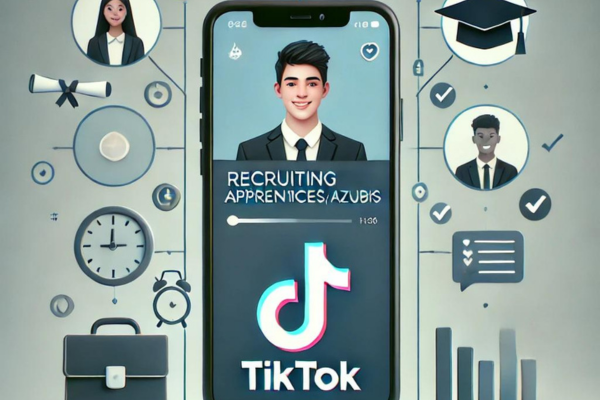THE PAYROLL Podcast Episode 11 – From Trainee to Payroll Pro – Jana’s Learning Journey carries on

Learning about payroll, the needs of Generation Z and recruiting young payroll talent: an interview with Jana.
A year ago, I wrote about Jana’s entry into the world of payroll in a blog article entitled ‘A learning journey comes to an end’. In episode 11 of THE PAYROLL Podcast, I talk to Jana about her journey over the last 12 months, her change of perspective, and whether she has found her place in payroll.
Sabine: Jana, it’s great to have you here today. Do you remember our first meeting?
Jana: Absolutely! At the time, I was an apprentice, and you came to our company as the project manager for an outsourcing project. I was directly involved and quickly became the main point of contact, even though I was still in the middle of my training.
Sabine: You acted very responsibly even back then. Was that your entry into payroll?
Jana: Yes, I just kind of fell into it. Through the project, I quickly realised how exciting the topic could be. Since I was already responsible for data delivery, I was given more responsibility aft
Jasmin’s Success Story – Her Payroll Journey from Trainee to Junior Payroll Specialist!

Jasmin is a second-year Industrial Management apprentice. During her placement in the HR and Payroll department, she caught the attention of the Payroll Management Team. Interested in Payroll? Motivated? Proactive? Jackpot! The management team is delighted, as they urgently need to solve their problem of shortage of skilled labour.
They had already decided to train Jasmin in payroll through a learning journey. The interactive Payroll Academy trainee webinar on payroll and AI served as an introduction. It sparked the interest of other trainees and set the stage for the start of the payroll learning journey, which is playful, practical and digitally supported.
Basic training in the learning journey model
Jasmin worked her way through all the content, from labour law to income tax to social security, with curiosity, discipline, and genuine interest. I was particularly impressed by her independence — she didn’t just want to ‘get through’ it; she wanted to understand how payroll works in everyday life.
Since she had block phases at vocational school during the learning journey, we were able to adapt the flexible concept optimally. Between live training sessions, Jasmin used the learning platform to review and consolidate her learning. She was also given specific tasks to work on, which we reflected on in coaching sessions.
Conclusion: Jasmin has a talent for payroll – and the desire to use it!
Not everyone has a knack for payroll accounting, but Jasmin does. More importantly, she has genuine interest, which cannot be taught.
She is now beginning her practical training in HR and payroll accounting, with a clear understanding of the daily payroll process and a strong technical foundation.
We are already discussing a possible specialisation with the payroll accounting manager after the practical phase. I would be delighted to continue supporting Jasmin.
DER PAYROLL PODCAST – Episode 12: Putting the AI assistant Buddy to the test!

My guest on the podcast this episode is Uwe Klappich, Cluster Lead New Payroll Technology at SD Worx.
A year ago, in episode 7, Buddy, the new real-time payroll system, was still in development. Now, Buddy is live and comes with a smart AI assistant.
In this episode, we discuss developments since the last episode, take a look at the live demo and talk about the future of payroll, especially for small and medium-sized enterprises.
The interview with Uwe Klappich/SD Worx
Sabine: Mr Klappich, we last spoke on the podcast a year ago. At that time, Buddy was still in development. What is the situation today, and what is Buddy’s current status?
Uwe Klappich: Yes, back then it was just an idea, but now Buddy is being used in pilot projects. We are testing it with selected customers, and the feedback has been very positive. Real-time payrol
Success Story: Jana’s learning journey – discover how payroll learning works!

In September 2023, right after completing her apprenticeship, Jana was offered the role of HR Specialist, responsible for coordinating with a new payroll service provider.
A fantastic opportunity – but also a big challenge: a new role, high responsibility, and complex payroll topics.
Approach
As her Payroll Learning Coach, I supported Jana over several months.
Through regular half-day training sessions, always tied to her daily tasks, we strengthened her payroll accounting skills step by step.
The focus: practical, bite-sized learning units – directly applicable to her work.
Results
From day one, Jana stood out for her motivation:
She asked insightful questions and thoroughly reviewed the new service provider’s work.
She wanted to leave everything organized and in order.
She didn’t shy away from new or difficult topics and actively sought support – either from me or external sources.
Smart payroll – the next generation of payroll

In episode #7 of the DER Payroll Podcast, my guest is Uwe Klappich, Cluster Lead for Payroll Technology at SD Worx. We talk about the use of artificial intelligence (AI) and innovations in payroll. Klappich, who is leading the development of a new in-house payroll software, explains how this technology can make work processes more efficient and what opportunities and challenges it presents for companies and payroll accountants.
Sabine Katzmair: Mr Klappich, do you personally already use AI applications such as ChatGPT or other tools in your daily work?
Uwe Klappich: Yes, definitely! I use ChatGPT and Gemini from Google, but only privately so far. AI tools like these are extremely practical for finding answers quickly, developing ideas and discovering alternative perspectives. Of course, it’s a bit more complicated when it comes to business data. Data privacy and security are very important, so I don’t use external AI applications for our company data yet. But I use AI almost every day in my personal life. The ability to ask questions and then tailor the answers to my needs is really helpful. For example, you can generate more polite or more detailed answers – this saves time and provides new ideas.
Sabine Katzmair: Why did SD Worx decide to develop its own payroll system when there are already numerous solutions on the market?
Nursing care insurance in Germany: financing, benefits and changes for 2025

Long-term care insurance is an important part of the German social security system. It was introduced in 1995 as the fifth pillar of the social security system to cover the risks associated with the need for long-term care. Since then, it has undergone a number of changes in order to adapt to social and demographic challenges.
German long-term care insurance in international comparison
The countries with the most comprehensive and user-friendly long-term care systems are Denmark, Sweden and the Netherlands. Germany follows closely behind with good care services.
However, the German system is limited to benefits for significant care needs (care levels) and, unlike other countries, involves considerable co-payments – up to 50% of the costs can be borne by the person in need of care.
Compulsory insurance
In Germany, people with statutory health insurance (GKV) are automatically obliged to take out statutory long-term care insurance.
Those with private health insurance must take out private long-term care insurance. Here, too, both systems are compulsory. The benefits of private long-term care insurance are not very different from those of statutory long-term care insurance, but they can of course vary somewhat, as the policyholder decides on the benefits to be covered.
Retroactive increase in basic tax exemption amount planned – retroactive calculation in December payroll 2024

Retroactive calculations will probably be used again in the December payroll this year, if the federal government passes the law on the tax exemption of the minimum subsistence level this year. The basic tax-free amount and the tax-free amount for children will be increased retroactively for 2024, as the minimum subsistence level has risen more […]
Junge Talente anziehen mit Tiktok – modernes Recruiting für Unternehmen

Im August und September 2024 haben wieder viele Azubis ihre Ausbildungsstellen angetreten. Jedoch blieben auch dieses Jahr wieder viele Ausbildungsstellen unbesetzt. Deshalb müssen Unternehmen in einer Zeit, in der der Fachkräftemangel zur Herausforderung wird, neue Wege gehen, um geeignete Auszubildende zu finden. Eine Plattform, die dabei oft übersehen wird, bietet jedoch enormes Potenzial: TikTok. Mit […]
